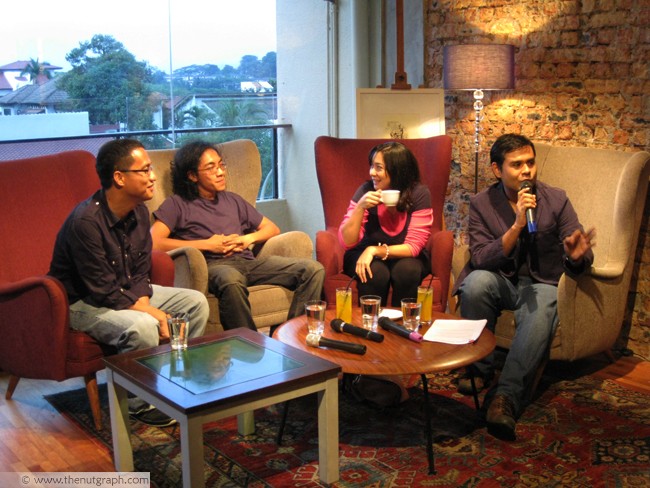MALAYSIA needs to stop building walls and start learning to innovate if show business is to grow and develop in the country. This and other show biz topics were discussed during The Nut Graph‘s Found in Conversation: Creativity and Innovation in Show Biz forum on 8 Aug 2010 in Kuala Lumpur.
When asked about enhancing creativity and innovation in show biz, 8TV executive director and Media Prima chief executive officer of Alt Media Ahmad Izham Omar said Malaysia had to stop building protective walls whenever it felt under threat. “We had Indonesian songs coming in and competing. People said, ‘Let’s shoo them out of our country.’ But we don’t realise, Indonesia also can shoo our songs out of their country. And just like that, we lose 200 million people that could be listening to us.”

Ahmad Izham said the same logic is applied to advertisements aired on Malaysian television and radio, which the government insists must be made locally. “Many of the big players like Tag Heuer, Adidas, Levis, they have advertisements made all over the world. But they can’t be shown in Malaysia because of this ruling. [So instead of making a new advertisement just for Malaysia], they channel their advertisement spending to newspapers.”
Ahmad Izham said by protecting six or seven large Malaysian advertising companies with the ruling, it in fact causes 200 local production houses to suffer from decreased revenue. And ironically, most of the large advertising companies in Malaysia are foreign-owned.
“We shouldn’t keep putting up walls,” said Ahmad Izham. “We should be building wings instead so that everybody can fly.” He said whether or not Malaysian show biz would fly or fall would depend heavily on whether there was enough infrastructure to support it.
“Revolution [in show biz] can only happen when everybody moves together,” said Ahmad Izham. He cited alternative band OAG, which was instrumental in making alternative music mainstream in Malaysia in the 1990s.

“When OAG was part of the underground scene, it was revolutionary, but it was not in the mainstream. When they were pushed to mainstream music, suddenly everyone liked them, but it was not yet a revolution. Revolution only happened when other underground acts started being promoted and everyone got their share. Bands like Butterfingers, Poetic Ammo, Too Phat.”
Closed-mindedness
Moderator Shanon Shah also asked the other panelists, singer-songwriter Azmyl Yunor and actor-director Joanna Bessey, about their experiences with closed-mindedness and censorship by the authorities.
Azmyl said artists were easy targets for authorities wanting to flex their muscles, citing the black metal scene as an example. “There are a lot of youth in the [black metal] audience – they’re not economically strong, they don’t have a lot of influence, so they’re easy targets for raids,” he said.
Bessey said sometimes censorship or bans could arise from just one person’s strong reactions. “You might have 5,000 people saying [a play] is fantastic. All it takes is just one person complaining to the right authority for action to be taken against you. And often, this happens without a true revision of the facts.”
Bessey cited the second run of the play The Vagina Monologues, which was banned after being successfully staged in January 2002. “I doubt the authorities who banned it even read the play’s script,” said Bessey.
The panelists also singled out media owners who pushed journalists to look for sensationalist angles to cover show biz stories. “The journalism [on The Vagina Monologues] hurt us,” said Bessey.

Ahmad Izham said the media also played a part in sensationalising the incident involving Faizal Tahir. There was public outrage after the artiste removed his shirt during a performance, revealing an “S” painted on his chest.
“In the beginning, there was [just] some [unease] about the incident,” said Izham. “But a few days later, a politician raised the issue and this was picked up by the media. Suddenly, there was a big reaction. And we got hit with a fine.” Faizal was also banned for three months from appearing on television and radio.
Bessey said creative ways were needed to overcome the authorities’ closed-mindedness. “Sometimes, the [council] people, they’re just afraid of losing their jobs. So we need to be strategic and see it from their point of view.”
She recalled how the play The Baltimore Waltz was almost banned on opening night on the basis that one of the main characters is gay. However, Bessey told the authorities that the gay character dies from AIDS in the end, which resulted in them relenting and allowing the play to be staged.
“Six sources of income”
Earning a living to keep their craft going also required creativity, the panelists said. “Most Malaysian artists have more than three sources of income,” said Bessey. “I have about six although they mostly utilise the same skills. I do voice-overs, theatre, television, a bit of writing.”
“Finding different sources of income is also part of creativity,” said Azmyl. “That itself will be a source of creativity in you. How to stay alive, how to stay afloat.”
Getting audiences to attend plays and gigs is also an issue in show biz. Azmyl said often, it was a matter of economics. “People go to work at 7[am] and go home at 9[pm]. They are struggling just to be able to isi minyak. How will they go for gigs? The lack of a minimum wage also contributes to this situation.”
But keeping the arts alive involves more than getting audiences out to events. It also involves changing attitudes through education. “I would go for the primary schools,” said Ahmad Izham. “And the next generation will solve itself. Politicians would be smarter, people would be more progressive.”
Azmyl said the population’s attitude needed to be shaped in school, and that how music was taught needed to be revamped altogether. “I only learnt the recorder in school. All you learn is how to clean it. When I wanted to play other songs, I got scolded by the teacher,” he said. “I didn’t even like music until I was 16.” ![]()
The Nut Graph needs your support
Found in Conversation is a series of conversations hosted by The Nut Graph with our media partner PopRadeeo and venue sponsor Leonardo’s Dining Room and Wine Loft. It aims to link personalities, ideas and people, and to provide opportunities for the public to engage with notable personalities and industry experts.
The next forum, to be held in late September, will be on creativity and innovation in eco-friendly living. Look out for more information on The Nut Graph website, or follow us on Twitter and Facebook, or sign up for our e-newsletter.
Related Post: Lights, camera, show biz!
MALAYSIA needs to stop building walls and start learning to innovate if show business is to grow and develop in the country. This and other showbiz topics were discussed during The Nut Graph‘s Found in Conversation: Creativity and Innovation in Showbiz forum on 8 Aug 2010 in Kuala Lumpur.
When asked about enhancing creativity and innovation in showbiz, 8TV‘s executive director and Media Prima chief executive officer of Alt Media Ahmad Izham Omar said Malaysia had to stop building protective walls whenever it felt under threat. “We had Indonesian songs coming in and competing. People said, ‘Let’s shoo them out of our country’. But we don’t realise, Indonesia also can shoo our songs out of their country. And just like that, we lose 200 million people that could be listening to us.”
Ahmad Izham said the same logic is applied to advertisements aired on Malaysian television and radio, which the government insists must be made locally. “Many of the big players like Tag Heuer, Adidas, Levis, they have advertisements made all over the world. But they can’t be shown in Malaysia because of this ruling. [So instead of making a new advertisement just for Malaysia], they channel their advertisement spending to newspapers.”
Ahmad Izham said by protecting six or seven large Malaysian advertising companies with the ruling, it in fact causes 200 local production houses to suffer from decreased revenue. And ironically, most of the large advertising companies in Malaysia are foreign-owned.
“We shouldn’t keep putting up walls,” said Ahmad Izham. “We should be building wings instead so that everybody can fly.” He said whether or not Malaysian showbiz would fly or fall would depend heavily on whether there was enough infrastructure to support it.
“Revolution [in showbiz] can only happen when everybody moves together,” said Ahmad Izham. He cited alternative band OAG, which was instrumental in making alternative music mainstream in Malaysia in the 1990s. “When OAG was part of the underground scene, it was revolutionary, but it was not in the mainstream. When they were pushed to mainstream music, suddenly everyone liked them, but it was not yet a revolution. Revolution only happened when other underground acts started being promoted and everyone got their share. Bands like Butterfingers, Poetic Ammo, Too Phat.”
Closed-mindedness
Moderator Shanon Shah also asked panellists, singer-songwriter Azmyl Yunor and actor-director Joanna Bessey, about their experiences with closed-mindedness and censorship by the authorities.
Azmyl said artists were easy targets for authorities wanting to flex their muscles, citing the black metal scene as an example. “There are a lot of youth in the [black metal] audience – they’re not economically strong, they don’t have a lot of influence, so they’re easy targets for raids,” he said.
Bessey said sometimes censorship or bans could arise from just one person’s strong reactions. “You might have 5,000 people saying [a play] is fantastic. All it takes sometimes is just one person complaining to the right authority for action to be taken against you. And often, this happens without a true revision of the facts.”
Bessey cited the second-run of the play The Vagina Monologues which was banned after being successfully staged in January 2002. “I doubt the authorities who banned it even read the play’s script,” said Bessey.
The panellists also singled out media owners who pushed journalists to look for sensationalist angles to cover showbiz stories. “The journalism [on The Vagina Monologues] hurt us,” said Bessey.
Ahmad Izham said the media also played a part in sensationalising the incident involving Faizal Tahir. There was public outrage after the artist removed his shirt during a performance, revealing an “S” painted on his chest. “In the beginning, there was some [unease] about the incident,” said Izham. “But a few days later, a politician raised the issue and this was picked up by the media. Suddenly, there was a big reaction. And we got hit with a fine.” Faizal was also banned for three months from appearing on television and radio.
Bessey said creative ways were needed to overcome the authorities’ closed-mindedness. “Sometimes, the [council] people, they’re just afraid of losing their jobs. So we need to be strategic and see it from their point of view.”
She recalled how the play The Baltimore Waltz was almost banned on opening night on the basis that one of the main characters is gay. However, Bessey told the authorities that the gay character dies of AIDS in the end, which resulted in them relenting and allowing the play to be staged.
“Six sources of income”
Earning a living to keep their craft going also required creativity, the panellists said. “Most Malaysian artists have more than three sources of income,” said Bessey. “I have about six although they mostly utilise the same skills. I do voice-overs, theatre, television, a bit of writing.”
“Finding different sources of income is also part of creativity,” said Azmyl. “That itself will be a source of creativity in you. How to stay alive, how to stay afloat.”
Getting audiences to attend plays and gigs was also an issue in showbiz. Azmyl said often, it was a matter of economics. “People go to work at 7[am] and go home at 9[pm]. They are struggling just to be able to isi minyak. How will they go for gigs? The lack of a minimum wage also contributes to this situation.”
But keeping the arts alive involves more than getting audiences out to events. It also involves changing attitudes through education. “I would go for the primary schools,” said Ahmad Izham. “And the next generation will solve itself. Politicians would be smarter, people would be more progressive.”
Azmyl said the population’s attitude needed to be shaped in school and that how music was taught needed to be revamped altogether. “I only learnt the recorder in school. All you learn is how to clean it. When I wanted to play other songs, I got scolded by the teacher,” he said. “I didn’t even like music until I was 16.” [TNG favicon]
The Nut Graph needs your support
Found in Conversation is a series of conversations hosted by The Nut Graph with our media partner PopRadeeo and venue sponsor Leonardo’s Dining Room and Wine Loft. It aims to link personalities, ideas and people, and to provide opportunities for the public to engage with notable personalities and industry experts.
The next forum, to be held in late September, will be on creativity and innovation in eco-friendly living. Look out for more information on The Nut Graph website, or follow us on Twitter and Facebook, or sign up for our e-newsletter.
Related Posts:


Sean says
“No, no, it’s all right: the gay character dies horribly.”
I LOLed and immediately felt very sad.